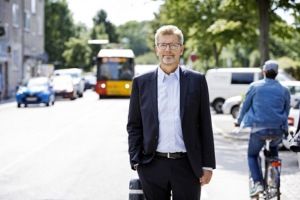News
Local elections 2017: Copenhagen for all under the banner of ‘Our city, together’
This article is more than 8 years old.
If re-elected, the current mayor Frank Jensen has pledged to keep Copenhagen a green and affordable city for all

When it comes to voting in the local elections, Frankly, you should give a a damn (photo: Socialdekokratiet)
Frank Jensen began his political career in the late 70s as chair of the youth wing of Socialkemokratiet, DSU, in Støvring.
He was elected into parliament for Socialdemokratiet in 1987, was a member of the finance committee from 1992-1994 and was the party’s political spokesperson until 1994 and again from 2002-2005.
Jensen has also held the posts of minister for education and science and minister of justice. Since 2009 he has been mayor of Copenhagen. In that capacity, he oversees an annual budget of 50 billion kroner and employs over 40,000 staff.
He is standing for re-election under the slogan ‘Alt det vi har sammen’ – roughly translated as ‘Our city, Together’.
What makes a good local politician?
Local politics are about results visible in everyday life. Whether we are planting trees in your local park or digging cross-city metro lines, citizens are impacted by our decisions.
One of my key priorities is therefore to learn about the expectations and concerns of Copenhageners. This is why I spend a lot of my time visiting local shelters, businesses, local initiatives etc. To achieve results as a local politician you need to be able co-operate with everyone on the city council. You have to be straightforward – and true to your word.
You have had a long and successful career in national politics. Has this has been an advantage to you as mayor?
Yes! I have been an MP for many years and a minister for seven years – with portfolios in science and justice. At the city council I have been able to rely on my experience from parliament on reaching agreements and compromises in co-operation with many different political parties. Furthermore, I have found it useful to have a strong network in parliament when raising the voice of Copenhagen and pushing for new legislation.
What does your campaign slogan ‘Our city, Together’ (Alt det vi har sammen) actually mean?
“Alt det vi har sammen” – or “Our city, Together” is about Copenhagen and everything we share. What we have improved, and what we want to achieve in the future.
We live in a time where inequality is increasing – both on a global level and on the local level. My priority is to make sure that Copenhagen remains an inclusive city for all. This is why I have such a strong focus on providing affordable housing and on improving our schools for the benefit of all Copenhageners, not just a small, wealthy clique. That’s what “Our City, Together” is about.
Which areas politically are closest to your heart?
Creating equal opportunities is what drives me politically. I work for a diverse city where children are given the opportunities they need to develop their full potential.
This is closely linked to one of my key issues: Affordable and modern public housing. In my opinion Copenhagen should be for everyone and this of course begins with housing that people with average or lower incomes can afford.
What are your specific policies in these areas?
Over the next 10 years we are going to build 10,000 affordable homes (almene lejeboliger).
After five years of trying we finally convinced the national government to change the national planning legislation. We are now able to impose a 25 percent share of public housing in all new housing projects, thereby ensuring that Copenhagen remains an affordable city for people with average wages such as nurses and bus drivers. That’s also what “Our City, Together” is about.
A lot of expats and non-Danish speakers can vote, but some feel that perhaps it’s not worthwhile using their vote. What do you say to that, and what could you do for this group if you were elected?
Expats and non-Danish speakers are deeply affected in their everyday life by the policies and services of the City of Copenhagen. It is therefore important to vote and take active part in local democracy.
As part of the drive towards a ‘greener’ Copenhagen you have said that you want to ban diesel cars in the city from 2019. Is this realistic?
From 2019 we’ll phase out diesel cars. However a lot of people and business can’t just go out and buy a new car. So you can still enter the city if your diesel car is registered before 2019. In this way, diesel cars will disappear as they are scrapped.
Do you have any plans to strengthen public transport – and maybe even introduce lower fares?
We’re speeding up electrification of our bus lines. That will contribute substantially to cleaner air. The new metro Cityring will open in 2019, the extension to Nordhavn in 2020 and the Southern Line in 2023. We are continuously working on improving public transport and making it easier to get around in the city. The priority now is to improve public transportation rather than lowering the fares.
What is the main difference between your policies and those of the ‘blue’ bloc?
The right-wing parties want to reduce taxes whereas my priority is to invest in better day care and schools for our children as well as better care for the elderly. My ambition is to make sure that Copenhagen remains a green and sustainable city with a high quality of life for all Copenhageners.










































